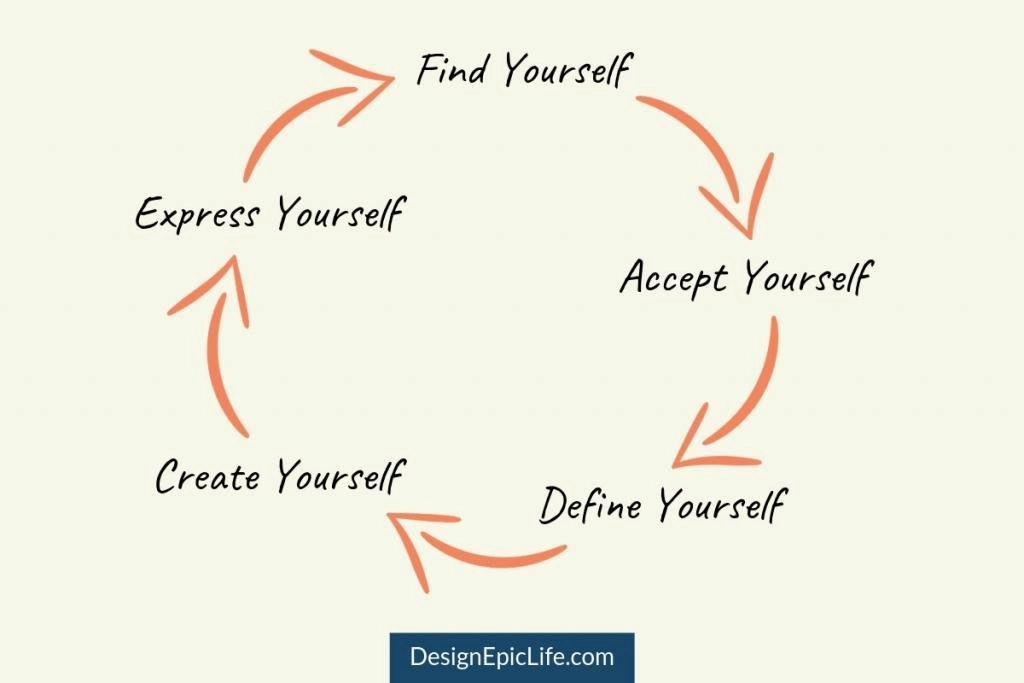How To Find Yourself And Build Limitless Confidence In Yourself
Who am I?
If you’ve asked this question before, you’re not alone.
The answer to the question lies in the Theseus paradox.
After Theseus returned home on a ship, Athenians maintained Theseus’ ship for 1000 years in the harbor to honor his heroic acts. One by one, they replaced each part of the ship to maintain it until they replaced every part of it.
The question remains — which ship is the actual one? Is it still the same old ship or is it a new ship?
There is no right answer to it. The essence of the ship remained the same, but you can also say it wasn’t the same ship since every part of it was replaced.
The same paradox applies to you.
- Are you the person who you were 5 years ago?
- Are you the person who you will become in the future?
- Are you the person who exists now?
Furthermore, which parts of you are “you”?
- Are you your physical body parts?
- Are you your thoughts and emotions?
- Are you your soul and spirit?
Finding yourself is a lifelong process. You never find all of you because you’re always in beta mode. Parts of you are being created and destroyed every moment you live.
How To Be Yourself
Knowing yourself is the beginning of all wisdom.
Aristotle

Finding yourself
You are unique. You’re born with certain traits and strengths you can leverage to fully thrive. These traits and strengths could be obvious to you or they could be hidden waiting for you to discover them.
Accepting yourself
Once you’ve discovered parts of yourself, you could stay in denial mode or you can use your self-awareness to accept and love yourself. But be careful not to get into self-defeating patterns that will stop you from growing. With awareness, you’ll know what to work on and what to eliminate or delegate.
Defining yourself
Self-fulfilling prophecies are the things you tell your subconscious mind to be true. When you believe something to be true, it becomes true in your mind. So don’t forget that it’s not all about finding yourself. You become who you want to be by defining yourself and using the growth mindset to excel.
Creating yourself
The growth mindset is about believing that you can achieve or improve anything you set your mind to. You can always ditch the bad parts in you and transform yourself into a new you. To become the person you want to be, take inspiration from others to adopt the habits, thoughts, beliefs, attitudes, values, and principles from different people you admire.
Expressing yourself
Suppressing and hiding are the biggest causes of misery. When you don’t express yourself, you stay depressed because depression is the opposite of expression. Expressing could mean opening up in front of people, talking to yourself, journaling, expressing yourself through art or hobby, etc.
Related: How To Be Yourself, Find Your Tribe And Let Go Of Social Anxiety
How To Build Confidence
Because one believes in oneself, one doesn’t try to convince others. Because one is content with oneself, one doesn’t need others’ approval. Because one accepts oneself, the whole world accepts him or her.
Lao Tzu
On your path of discovering and becoming yourself, self-doubt and low confidence will haunt you from time to time. While you can use self-doubt for good, most of the time it paralyzes you from taking action and becoming the best version of yourself.
So how do you develop natural confidence?
By developing the three pillars of self-confidence: self-efficacy, self-esteem, and self-reliance.
1. Building self-efficacy
Self-efficacy is your belief in your ability to achieve your goals. You need to convince your mind that you’re capable.
To do that, you can prove yourself (or others) wrong over and over again when you think you can’t do something. Do uncomfortable challenges and keep a record of every time you figure things out even when you had doubts within yourself. Over time, you’ll trust yourself and have complete faith in your ability to figure things out.
To get started with building that kind of confidence, go through a personal transformation. Transformations are the reason you see people who have lost weight or gained muscles overflowing with confidence.
To create such a change in yourself, you need cognitive dissonance as a catalyst to aid the transformation. Cognitive dissonance happens when your thoughts, beliefs, or attitudes mismatch with the person you want to become.
Reading books or articles, listening to podcasts or audiobooks, surrounding yourself with people who you want to be like are some ways to create the mental discomfort that comes from cognitive dissonance.
My example: Before getting into health and fitness, I was fat. I cringed every time I looked myself naked in the mirror. I was in college and I had full freedom to eat whatever I wanted. So I was stuffing myself with junk food all the time.
But then, I had it enough.
I bombarded myself with health and fitness information and surrounded myself with friends who were fit and eating better. For even more inspiration, I followed influencers online who acted as virtual mentors for me.
I did the same when I became an entrepreneur. Instead of telling myself that I was an “aspiring blogger or entrepreneur”, I learned it, practiced it, and made friends with a few fellow bloggers. I also followed the influencers who were already doing what I wanted to do.
2. Building self-esteem
Self-esteem is the evaluation of your own worth. Too much of it can lead to an inflated ego while too little of it can lead to a deflated ego.
So how do you find a healthy amount of self-esteem?
Stay true to the person you’ve chosen to become. In other words, have integrity.
While it’s okay to stay flexible to change your values (or their meaning) as you grow. But in general, you shouldn’t betray the values you’ve chosen to live by.
If you don’t stay true to yourself, your confidence will significantly drop down as you will no longer be loyal to yourself. You’ll stop trusting yourself and your self-esteem will suffer.
Another benefit of sticking to your values is that you’ll stop comparing yourself with others based on false parameters. The stereotypical way of comparing yourself with others is so sick that it will dig a hole in your heart and rob you of joy.
My example: Like most people, I was desperately chasing money. I took online surveys because some “gurus” told me that’s a great way to make money online.
After trading so many hours (and my sanity), I had a few bucks which I spent on a program that promised me to make a millionaire online using their “secret” tactics. Turns out, there were upselling me to a high-ticket multi-level-marketing program.
So I stopped blowing my time, energy, and money on the things that are not true to my values.
I know I value growth, peace, freedom, and fulfillment. I like making money because it gives me freedom and growth, but if I start comparing myself with others based on how much money I make, it’s a dead-end for me. Because I won’t take a dime from anyone if I have to sacrifice my freedom and peace of mind in the long-term.
It’s not about how much I make. What’s truly important to me is HOW I make the money. Once I have command over how I make money, I can scale it for more growth and freedom while still sticking to my values.
3. Building self-reliance
Self-reliance (or self-sufficiency) is the ability to rely upon yourself instead of depending on others. It means taking full responsibility for yourself and your life.
It has more to do with emotions than physical resources. When you’re self-reliant, you care less about other’s opinions of you and more about your own opinion of yourself.
To become emotionally self-reliant, become vulnerable while staying bulletproof. Here’s what I mean.
Real confidence doesn’t come from avoiding rejection, hate, shame, or judgment from other people. In fact, the more you hide, the more you’ll fear to put yourself out there. Real confidence comes from facing your fears and becoming vulnerable.
But being vulnerable is not enough because you may get hurt when people don’t approve of you. And as a protective mechanism, you’ll learn to hide even more.
True confidence comes when you know people will disapprove of you and yet, you stay loving, kind, compassionate, and accepting of yourself and others.
My example: When I left India for the first time to study in Scotland, I was excited. I was planning to be a social rock star of the college.
When I finally arrived at my new college, I couldn’t comprehend the words of most people because of their accent.
I was tired of asking people to repeat themselves and repeating myself during conversations. So I started avoiding interacting with people. And when I did talk to people, I zoned out during conversations. I was desperate for approval, and I was anxious if people would understand me, accept me, and like me.
I would make up stories in my mind that everyone around me was probably judging or hating me.
Then, I got obsessed with fixing my issues.
I worked on my emotions and I observed people with great social skills so I could become a better people person in any environment.
After upgrading your social skills and healing your emotions, you can step into a foreign environment and build rapport with people from different cultures, backgrounds, accents, etc. with no trouble.
Once you become bulletproof, you realize that every person has their own agenda and you don’t need an approval certificate from anyone in this world. It’s not because you’re arrogant, but because you love yourself (and others) so much that approval is insignificant.
If you are incompatible with someone, it’s in both people’s interests to go their separate ways so you both can thrive. Love everyone and wish everyone to thrive with or without you.
Ask the same from others — only allow those who help you become the best version of yourself to enter your life. And lovingly repel people who do the opposite.
Celebrate Yourself
“Be yourself; everyone else is already taken.”
Oscar Wilde
Know thyself, and celebrate your individuality because there’s no other person like you. Imagine how boring it would be if you were the exact copy of other people.
Never betray your heart by doing the opposite of what it tells you to do. You have a role to play. You can fill your life with meaning by doing what your inner intelligence (AKA gut feeling) tells you to do.
It doesn’t mean you forget logic and rationality. But you must balance it with trust, belief, and faith in yourself. Pure logic will make you miserable. The people who thrive combine the power of thinking and feeling.
Your journey is one of its kind. Don’t let it go to waste. Make it epic by choosing growth over comfort, courage over fear, and greatness over mediocrity.
